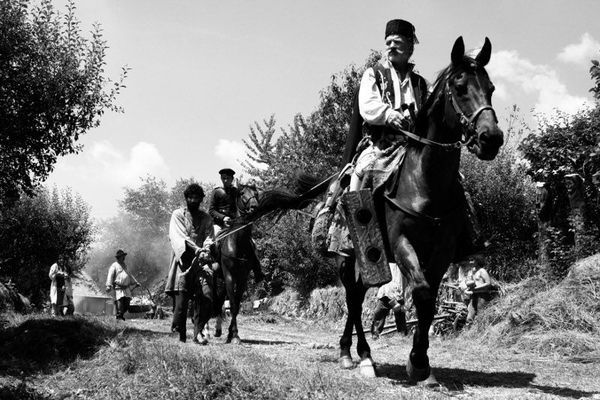Eye For Film >> Movies >> Aferim! (2015) Film Review
Aferim!
Reviewed by: Amber Wilkinson

Director Radu Jude sets his sights on the past in order to reflect the attitudes of the present in historical road-movie-cum-western Aferim! Sharply shot in black and white by cinematographer Marius Panduru, the prejudice in the film is similarly stark as we follow policeman Constandin (Teodor Corban) and his son Ionita (Mihai Comanoiu) on what amounts to a 'wild slave chase' through the Romanian countryside of the 1830s. Sometimes slowing to a trot that won't tire the horses, if there is a failing in the film it is its length in relation to narrative nitty gritty but Jude more than makes up for this during his more incisive observational moments.
The pair are hunting the hapless Carfin (Cuzin Toma) a gypsy slave - this choice of word and the general bawdy slang in the film is a result of extensive research into real accounts of the country's history of slavery (the practice wasn't outlawed the mid-1850s) by Jude and his co-writer Florin Lazarescu. Carfin's crime is to have been unlucky enough to have attracted the sexual attentions of his master's wife Sultana (Mihalea Sîrbu).

Jude and Lazarescu paint a grim picture of a feudal society where villagers are barely a notch above the slaves they trade back and forth and where the Church and land owners hold sway. Rather than wallow in the misery of it all, however, they find plenty of Samuel Beckett-style humour in holding the attitudes up for ridicule - a scene in which a priest lets rip a racist rant that brands each European nation with little more than a single word, marking himself out as a buffoon in the process, is nigh on perfect, and will lead to additional enjoyment if you happen to catch it, as I did in Berlin, with a pan-European crowd. At the bottom of the societal heap lie the Jewish - "Gypsies are human. Jews aren't," one character pontificates. The place of women, too, is on the bottom rung and, as the plight of Sultana ultimately shows, improves little with marital status.
The title translates as "Bravo!", and the irony runs thick through the film. Despite this, Constandin is a surprisingly engaging anti-hero, with his willingness to accommodate his son's desire to save Carfin and a child slave (Alberto Dinache) from the worst fate could bring, offering a glimmer of humanity beneath the bravura and racial abuse. The idea that situations shape attitudes cuts deep and the fact we are witnessing a father and son's progress is surely no accident, with the younger man's attitudes noticeably softer than that of Constandin. But Jude and Lazarescu also show how the structure of society has a habit of making you conform to it, whatever your good intentions - a barbed idea intended to stick in the minds of those who live in today's Europe where the Roma still face wide-spread prejudice (to that end, it would make an interesting double-bill with Toto And His Sisters).
Reviewed on: 13 Mar 2015

















